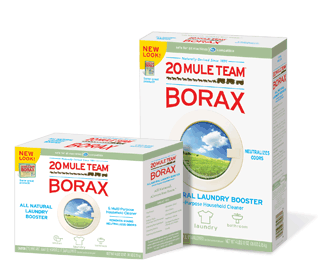 Borax is used frequently in homemade laundry soap, dishwashing powders, and personal care products. The question often arises: Is borax safe to use?
Borax is used frequently in homemade laundry soap, dishwashing powders, and personal care products. The question often arises: Is borax safe to use?
Borax, also known as sodium borate, sodium tetraborate, or disodium tetraborate, is a naturally occurring mineral composed of sodium, boron, oxygen, and water. (The scientific name for borax is sodium tetraborate decahydrate.) It is a white powder consisting of soft, colorless crystals that dissolve quickly in water.
Borax can be found in most grocery stores under the label 20 Mule Team (pictured here). Mountain Rose Herbs offers a version without the surfactants and detergents commonly found in commercial products.
According to 20 Mule Team Borax’s Material Safety Data Sheet, borax is a potential health hazard and should not be ingested:
Sodium borate and boric acid interfere with sperm production, damage the testes and interfere with male fertility when given to animals by mouth at high doses. Boric acid produces developmental effects, including reduced body weight, malformations and death, in the offspring of pregnant animals given boric acid by mouth.
The above mentioned animal studies were conducted under exposure conditions leading to doses many times in excess of those that could occur through product use or inhalation of dust in occupational settings. Moreover, a human study of occupational exposure to sodium borate and boric acid dusts showed no adverse effect on fertility.
Borax was added to the Substances of Very High Concern list by the European Chemicals Agency (ECHA) in December 2010, based on studies showing toxicity for reproduction.
Reassessment of boric acid/borax by the EPA's Office of Pesticide Programs found potential developmental toxicity.
Borax is classified by the EPA as a pesticide and is toxic to ants, cockroaches, termites, and other insects. In its chemicalWATCH Factsheet, the organization Beyond Pesticides says this about boric acid and its related compounds:
Boric acid is a low-toxicity, non-volatile mineral with insecticidal, fungicidal, and herbicidal properties. It has long been embraced as a safer alternative to highly volatile, synthetic chemical pesticides.
For information on using borax for weed control in lawns, see this GardenGuides.com article.
Clearly there are health risks associated with the use of borax. Therefore, it should be used with caution. It is important to note, however, that even table salt can be hazardous if ingested at high levels.
Given the small amount of borax used in homemade laundry powder and automatic dishwashing powder, the benefits may outweigh the risks. Since 1-2 tablespoons of the mixture is all that is needed per load, the amount of borax used is minimal. Compare this with the high amounts of petroleum-based chemicals present in conventional products. The exception would be for those using a greywater system (water from washing machines, sinks, etc. used for yard irrigation). Borax is best avoided for these systems. For more information, see the Greywater Action website.
Borax is a safe and effective cleaning agent for toilets. Allowed to set overnight, it will help eliminate iron rings and stains, with no harmful vapors.
The use of borax in personal care products is perhaps more questionable. Our skin and scalp easily absorb chemicals, both naturally occurring and synthetic. With all of the other natural alternatives available, it may be best to avoid borax in shampoos, lotions, and soaps.
As with any substance, knowledge and awareness are key. Used sparingly and with caution, borax may be utilized safely in the natural home.